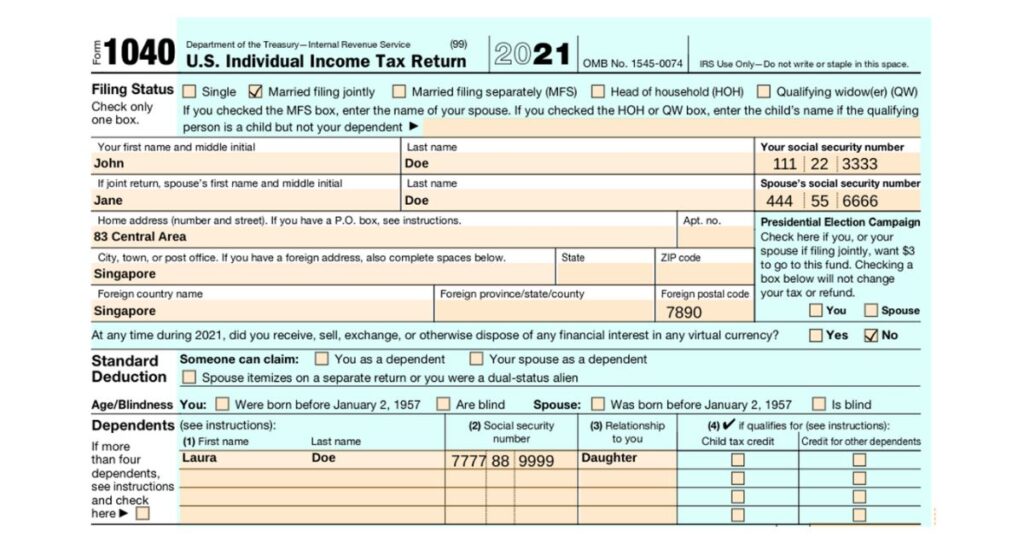Recognizing the Foreign Earned Earnings Exemption and Its Influence On Your Typical Deduction
The Foreign Earned Earnings Exclusion (FEIE) supplies significant advantages for migrants, enabling them to exclude a section of their foreign-earned income from U.S. taxation. Nevertheless, claiming the FEIE can make complex one's tax situation, particularly pertaining to the standard deduction. Comprehending this communication is necessary for people living abroad. As migrants browse these intricacies, they should consider how their options affect their total tax obligation obligation. What strategies can they use to optimize their economic outcomes?
What Is the Foreign Earned Income Exemption (FEIE)?
The Foreign Earned Earnings Exemption (FEIE) serves as a crucial tax benefit for united state residents and resident aliens working abroad. This stipulation allows eligible individuals to omit a considerable section of their foreign-earned income from U.S. taxes, successfully decreasing their general tax concern. The FEIE aims to minimize the financial stress on migrants and urges Americans to seek employment possibility in foreign markets. The exemption puts on wages, incomes, and expert charges earned while living in a foreign nation. The maximum exclusion quantity is readjusted each year for inflation, making sure that it continues to be appropriate to current financial problems. By utilizing the FEIE, expatriates can preserve more of their revenue, promoting financial security while living overseas. In general, the FEIE plays a crucial function in shaping the monetary landscape for Americans abroad, helping with a smoother shift to global workplace and promoting financial interaction on an international range.
Qualification Demands for the FEIE
Eligibility for the Foreign Earned Revenue Exclusion (FEIE) rests upon conference certain requirements established by the Internal Profits Solution (INTERNAL REVENUE SERVICE) Mostly, people must be united state people or resident aliens that make income while residing in an international country. To certify, they must satisfy either main tests: the Physical Existence Examination or the Authentic House Examination.
The Physical Presence Examination requires individuals to be physically existing in an international country for a minimum of 330 complete days within a 12-month period - FEIE Standard Deduction. Conversely, the Bona Fide House Examination demands that individuals develop residency in a foreign nation for a continuous period that consists of an entire tax obligation year
In addition, the revenue should be derived from personal services performed in the international nation. Fulfilling these requirements allows taxpayers to leave out a significant section of their foreign-earned earnings from united state taxation, therefore reducing their general tax liability.
How to Claim the FEIE

To begin the procedure, individuals ought to collect records that verify their foreign profits, such as pay stubs, income tax return from foreign nations, and any type of relevant employment agreement. It is essential to ensure all income asserted under the FEIE is made from foreign sources and fulfills the needed thresholds.
Furthermore, taxpayers should take into consideration submitting target dates and any feasible extensions. Claiming the FEIE appropriately not just assists in decreasing tax responsibility yet likewise ensures conformity with internal revenue service guidelines. Correct documents and adherence to standards are important for a successful case of the Foreign Earned Earnings Exemption.
The Interaction In Between FEIE and Common Reduction
The interaction between the Foreign Earned Earnings Exclusion (FEIE) and the typical deduction is a necessary element of tax preparation for expatriates. Recognizing the fundamental concepts of FEIE, in addition to the limitations of the common deduction, can considerably affect tax filing methods. This area will explore these elements and their effects for taxpayers living abroad.
FEIE Basics Discussed
While several migrants seek to decrease their tax problem, comprehending the interaction in between the Foreign Earned Revenue Exemption (FEIE) and the standard deduction is important. The FEIE allows U.S. people and resident aliens living abroad to leave out a particular amount of international made income from U.S. tax. This exemption can substantially lower gross income, possibly affecting qualification for various other deductions, such as the conventional deduction. Extremely, people who claim the FEIE can not additionally take the common deduction against the excluded earnings. Consequently, expatriates have to carefully review their overall income and reductions to maximize their tax scenario. Understanding of these communications can result in more enlightened financial decisions and far better tax obligation techniques for migrants steering with their one-of-a-kind scenarios.
Criterion Reduction Limitations
Comprehending the limitations of the common reduction in connection with the Foreign Earned Earnings Exclusion (FEIE) is crucial for expatriates maneuvering their tax obligation responsibilities. While the FEIE enables qualifying people to leave out a particular quantity of foreign-earned revenue from U.S. taxation, it can impact the typical reduction they are qualified to case. Especially, taxpayers that claim the FEIE can not additionally claim the basic reduction on that left out revenue. Furthermore, if an expatriate's overall earnings falls listed below the basic deduction threshold, they might not gain from it at all. This interaction demands cautious planning to maximize tax benefits, as underutilizing the basic reduction can result in greater taxable earnings and increased tax responsibility. Comprehending these limitations is crucial for reliable tax approach.
Tax Filing Ramifications
Steering the tax declaring ramifications of the Foreign Earned Revenue Exclusion (FEIE) calls for careful factor to consider of how it interacts with the common deduction. Taxpayers using the FEIE can exclude a significant part of their foreign-earned revenue, however this exemption impacts their eligibility for the conventional deduction. Especially, if a private insurance claims the FEIE, they can not additionally claim the standard deduction for that revenue. This can result in a reduced general tax obligation obligation yet may complicate the filing procedure. In addition, taxpayers must guarantee compliance with IRS requirements when filing Type 2555 for the FEIE. Comprehending these interactions is essential for maximizing my site tax obligation benefits while pop over here avoiding potential pitfalls in the filing process. Cautious planning can take full advantage of benefits and lessen responsibilities.
Potential Tax Implications of Making Use Of the FEIE
The Foreign Earned Revenue Exemption (FEIE) provides considerable tax benefits for U.S. people functioning abroad, yet it also includes potential ramifications that require cautious factor to consider. One major effect is the influence on eligibility for sure tax credit histories and reductions. By electing to utilize the FEIE, taxpayers might accidentally decrease their modified gross earnings, which can restrict accessibility to credit ratings like the Earned Income Tax obligation Credit or minimize the amount of typical deduction offered.
In addition, individuals that make use of the FEIE may encounter problems when going back to the united state tax obligation system, specifically concerning the taxes of future income. The exemption uses only to gained income, indicating other revenue kinds, such as dividends or passion, remain taxable. This distinction demands careful record-keeping to assure conformity. The FEIE may impact state tax obligation obligations, as some states do not acknowledge the exclusion and may strain all revenue gained by their residents, no matter of where it is gained.
Tips for Optimizing Your Tax Obligation Advantages While Abroad
While functioning abroad can be improving, it additionally presents special possibilities to enhance tax benefits. To take full advantage of these benefits, people need to initially establish their eligibility for the Foreign Earned Earnings Exemption (FEIE) and consider the physical presence examination or the bona fide home test. Maintaining detailed documents of all revenue made and expenses incurred while abroad is crucial. This documents sustains insurance claims for credit reports and deductions.
Additionally, recognizing the tax treaties in between the United States and the host nation can assist prevent dual taxation. Individuals need to likewise discover contributions to tax-advantaged accounts, such as IRAs, which may offer more reductions.

Seeking advice from a tax professional specializing in expatriate tax obligation regulation can provide customized approaches and assurance conformity with both U.S. and foreign tax obligation commitments. By taking these steps, expatriates can successfully enhance their financial circumstance while living abroad.
Often Asked Inquiries
Can I Make Use Of FEIE if I Help a Foreign Government?
Yes, an individual can utilize the Foreign Earned Income Exemption (FEIE) while working for a foreign government, given they satisfy the requisite conditions detailed by the IRS, consisting of the physical visibility or authentic house tests.

Does FEIE Relate To Self-Employment Income?
The Foreign Earned Earnings Exemption (FEIE) does put on self-employment income, supplied the specific meets the essential demands. Qualified self-employed individuals can leave out qualifying income gained while living in an international country from taxation.
What happens if My Foreign Earnings Goes Beyond the FEIE Limit?
The excess amount might be subject to United state tax if international income exceeds the FEIE restriction. Taxpayers should report and pay taxes on the revenue over the exclusion threshold while still taking advantage of the exclusion.
Can I Assert the FEIE and Itemize Deductions?
Yes, people can assert the Foreign Earned Earnings Exclusion (FEIE) while likewise making a list of deductions. They need to be aware that asserting the FEIE might impact the schedule of specific itemized deductions on their tax obligation return.

Exactly How Does FEIE Affect My State Tax Commitments?
The Foreign Earned Income Exemption can decrease state tax responsibilities, as several states comply with federal guidelines. Specific state rules vary, so it's necessary to get in touch with state tax obligation laws for specific implications check this on tax obligation duties.
The Foreign Earned Revenue Exemption (FEIE) uses considerable benefits for migrants, permitting them to leave out a part of their foreign-earned income from U.S. taxation. While many expatriates seek to decrease their tax worry, comprehending the communication in between the Foreign Earned Earnings Exemption (FEIE) and the conventional deduction is essential. Recognizing the constraints of the typical reduction in relationship to the Foreign Earned Earnings Exclusion (FEIE) is important for migrants navigating their tax obligation obligations. The exemption applies only to earned earnings, meaning various other earnings kinds, such as returns or passion, continue to be taxable. The Foreign Earned Revenue Exclusion (FEIE) does apply to self-employment revenue, gave the private satisfies the needed needs.